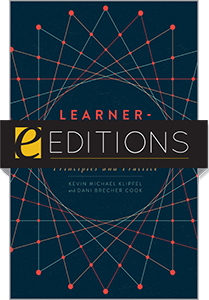
Learner-Centered Pedagogy: Principles and Practice—eEditions e-book
The download link for this product can be found on the final confirmation screen after you complete your purchase, and may also be accessed from your Account Profile. For more information about ALA eEditions file types and how to view them on eReaders, desktop computers, and other devices, see this page.
Primary tabs
You don't need to be an ALA Member to purchase from the ALA Store, but you'll be asked to create an online account/profile during the checkout to proceed. This Web Account is for both Members and non-Members.
If you are Tax-Exempt, please verify that your account is currently set up as exempt before placing your order, as our new fulfillment center will need current documentation. Learn how to verify here.
- Description
- Table of Contents
- About the authors
- Reviews
Today's emphasis on metrics and personalization make evidence-based instruction an imperative. In this practice-based handbook, the authors draw on the research of the humanistic psychologist and educator Carl Rogers to present an empathetic approach to information literacy sessions, reference service, and outreach. With an eye on everyday library work, they offer concrete, empirically-based strategies to connect with learners at all levels. Offering plentiful examples of pedagogy in action, this book covers:
- 6 cognitive principles for organizing information literacy instruction, with sample worksheets and organization tools for instruction planning;
- how to establish rapport and kindle learners' motivation;
- tactics for transcending "cite 5 sources" and other uninspiring research assignments;
- educational evidence debunking the mythical perception that because students are skilled at computers and mobile technology, they already know how to do research;
- questions to keep in mind for inspiring autonomous learning;
- the power of story, as described by Joan Didion, Brené Brown's Ted Talk, and educational psychology research;
- the science behind information overload; and
- a balanced framework for evaluating specific educational technology tools.
Fusing theory with practice, this handbook is a valuable resource to help every practitioner connect with learners more effectively.
The authors blog at Rule Number One: A Library Blog.
Acknowledgments
Introduction
Chapter One: What Is Learner-Centered Pedagogy?
Chapter Two: Authenticity and Autonomy: Becoming Partners in Learning
Chapter Three: Empathy and the Science of Learning: Lessons from the Cognitive Literature
Chapter Four: Relationships: The Heart of Learner-Centered Pedagogy
Chapter Five: Cultivating a Growth Mindset
Chapter Six: The Learner-Centered Library Technologist: Applying Learner-Centered Pedagogy
Conclusion: The Timelessness of Learner-Centered Pedagogy
Directions for Further Reading
About the Authors
Index
Kevin Michael Klipfel
Kevin Michael Klipfel received his master’s degree in philosophy from Virginia Tech, where he was subsequently a lecturer in moral, political, and existential philosophy. He received his M.S.L.S. from the University of North Carolina at Chapel Hill, where his master’s research on authenticity, motivation, and information literacy learning won the Dean’s Achievement Award for the Best Master’s paper of 2013 in the School of Information in Library Science. He has presented nationally on student motivation and learning both in and outside the library profession. He has published articles on the application of humanistic and existential psychology to learner-centered information literacy learning in journals such as College and Research Libraries and Reference Services Review.
Dani Brecher Cook
Dani Brecher Cook is director of teaching and learning at University of California, Riverside. She holds an MSLS from the University of North Carolina at Chapel Hill and an AB in English Literature from the University of Chicago. She has published on information literacy pedagogy and learning technologies in College and Research Libraries News, Reference and User Services Quarterly, and Communications in Information Literacy. She has presented on the intersection of these two topics nationally at conferences such as that of ACRL, LITA Forum, LOEX, and the Library Technology Conference. Prior to becoming a librarian, she worked in the publishing industry.
"Current librarians who take the time to read through the extensive research provided in this text will give more consideration to what it is like to be a learner today, and perhaps will find new approaches to integrate into their work with patrons of all ages."
— VOYA
"Succinctly demonstrates the need for empathy in self-directed learning. This title is compelling in design; theory and practicality entwine, and infographics generate intentional engagement ... Highly recommended."
— ARBA
"Does a good job in showing how learner-centered pedagogy can be applied to library teaching to produce significant student learning. It is recommended for academic librarians, but other librarians will find it useful, too."
— Catholic Library World


